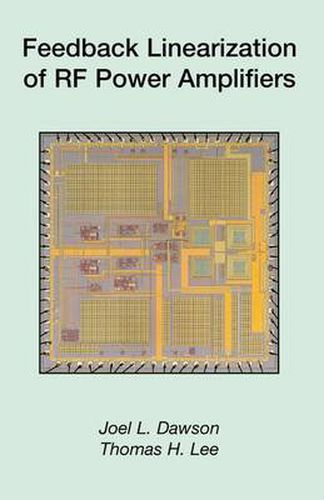Readings Newsletter
Become a Readings Member to make your shopping experience even easier.
Sign in or sign up for free!
You’re not far away from qualifying for FREE standard shipping within Australia
You’ve qualified for FREE standard shipping within Australia
The cart is loading…






This title is printed to order. This book may have been self-published. If so, we cannot guarantee the quality of the content. In the main most books will have gone through the editing process however some may not. We therefore suggest that you be aware of this before ordering this book. If in doubt check either the author or publisher’s details as we are unable to accept any returns unless they are faulty. Please contact us if you have any questions.
Improving the performance of the power amplifier is the most pressing problem facing designers of modern radio-frequency (RF) transceivers. Linearity and power efficiency of the transmit path are of utmost importance, and the power amplifier has proven to be the bottleneck for both. High linearity enables transmission at the highest data rates for a given channel bandwidth, and power efficiency prolongs battery lifetime in portable units and reduces heat dissipation in high-power transmitters. Cartesian feedback is a power amplifier linearization technique that acts to soften the tradeoff between power efficiency and linearity in power amplifiers. Despite its compelling, fundamental advantages, the technique has not enjoyed widespread acceptance because of certain implementation difficulties.
Feedback Linearization of RF Power Amplifiers introduces new techniques for overcoming the challenges faced by the designer of a Cartesian feedback system. The theory of the new techniques are described and analyzed in detail. The book culminates with the results of the first known fully integrated Cartesian feedback power amplifier system, whose design was enabled by the techniques described.
Feedback Linearization of RF Power Amplifiers is a valuable reference work for engineers in the telecommunications industry, industry researchers, academic researchers.
$9.00 standard shipping within Australia
FREE standard shipping within Australia for orders over $100.00
Express & International shipping calculated at checkout
This title is printed to order. This book may have been self-published. If so, we cannot guarantee the quality of the content. In the main most books will have gone through the editing process however some may not. We therefore suggest that you be aware of this before ordering this book. If in doubt check either the author or publisher’s details as we are unable to accept any returns unless they are faulty. Please contact us if you have any questions.
Improving the performance of the power amplifier is the most pressing problem facing designers of modern radio-frequency (RF) transceivers. Linearity and power efficiency of the transmit path are of utmost importance, and the power amplifier has proven to be the bottleneck for both. High linearity enables transmission at the highest data rates for a given channel bandwidth, and power efficiency prolongs battery lifetime in portable units and reduces heat dissipation in high-power transmitters. Cartesian feedback is a power amplifier linearization technique that acts to soften the tradeoff between power efficiency and linearity in power amplifiers. Despite its compelling, fundamental advantages, the technique has not enjoyed widespread acceptance because of certain implementation difficulties.
Feedback Linearization of RF Power Amplifiers introduces new techniques for overcoming the challenges faced by the designer of a Cartesian feedback system. The theory of the new techniques are described and analyzed in detail. The book culminates with the results of the first known fully integrated Cartesian feedback power amplifier system, whose design was enabled by the techniques described.
Feedback Linearization of RF Power Amplifiers is a valuable reference work for engineers in the telecommunications industry, industry researchers, academic researchers.